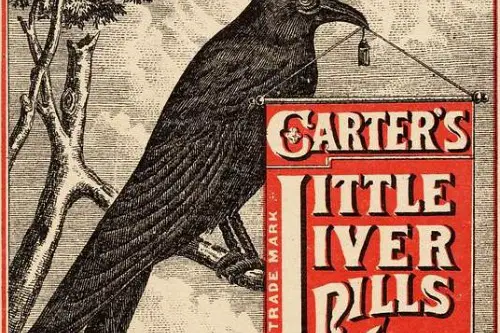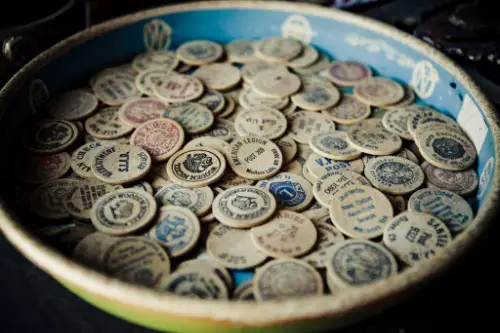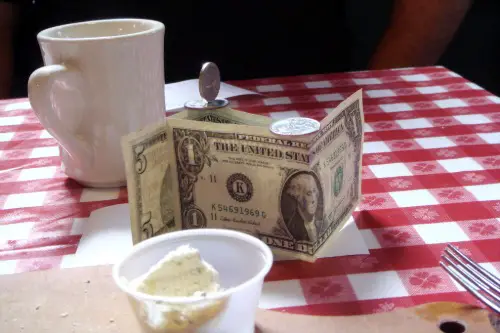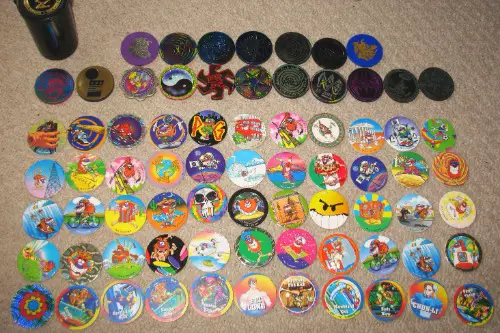1. “He’s got more ___ than Carter has little liver pills”

This saying was a go-to for exaggeration, with the blank filled in by whatever fit the situation—money, ideas, bad habits, you name it, Southern Living explains. The reference was to Carter’s Little Liver Pills, a laxative that was aggressively marketed in the early 1900s. The brand became so well-known that people used it as a shorthand for “a whole lot of something.” If someone had more problems than Carter had liver pills, they were in deep trouble.
The phrase lost steam after the 1950s when the product faded from public consciousness. By 1980, the FDA had forced Carter’s to drop the claim that the pills helped with liver problems, and the brand became just another relic of old-school medicine. Today, most people under 50 have never heard of Carter’s Little Liver Pills, let alone used them in a comparison. If this phrase ever pops up in conversation now, it’s more likely to get confused looks than nods of agreement. People today might say “more drama than a reality show” or “more problems than a math book,” but Carter’s pills? That’s history.
2. “Don’t take any wooden nickels”

This old saying was once a common way of warning someone not to be fooled or taken advantage of, according to AP News. It dates back to the late 19th and early 20th centuries, when wooden nickels were sometimes used as tokens or promotional items. While they weren’t necessarily scams, they weren’t legal currency either, so if someone handed you one expecting real money, you’d be out of luck. The phrase became popular during the Great Depression when financial scams were rampant, and it served as a general reminder to be cautious in business and personal dealings.
These days, though, nobody is worried about wooden nickels. In an era of credit cards, digital payments, and cryptocurrency, the idea of receiving fake wooden money feels almost absurd. Younger generations have plenty of other ways to warn each other about scams, from “stay woke” to “don’t get finessed.” Plus, fraud has taken on a much more high-tech form—think phishing emails and deepfake videos—so an old-fashioned phrase about physical currency doesn’t quite capture modern dangers. If you ever do hear this one, it’s probably from someone who remembers a time when cash was king and handshake deals actually meant something.
3. “Let’s not and say we did”

This was a playful, sometimes sarcastic way of declining to do something while pretending you had, according to Urban Dictionary. It was particularly popular among kids and teenagers in the mid-20th century, often used when faced with a chore or task they wanted to avoid. If your friend suggested going to a boring event, you might shrug and say, “Let’s not and say we did,” effectively shutting down the idea while keeping things lighthearted.
Today, this phrase has largely fallen out of use, replaced by shorter, snappier rejections like “hard pass” or just “nah.” Social media has also changed the way we interact—people are more direct, and humor tends to be punchier. Plus, with so much of our lives documented online, it’s harder to “say we did” something without evidence. In an era of Instagram stories and check-ins, pretending you did something when you didn’t just isn’t as easy as it used to be.
4. “That and a dime will get you a cup of coffee”

This saying was once a sarcastic way of telling someone that what they had wasn’t worth much. It was often used when someone bragged about a small achievement or an insignificant skill. The idea was that even if you had something to offer, it wasn’t going to get you very far—just like having a dime wasn’t going to buy much on its own.
The phrase originated back when a cup of coffee actually cost a dime, which makes it wildly outdated today. Not only does coffee cost significantly more now, but inflation has made the comparison meaningless. These days, people are more likely to say, “That and $5 will get you a latte” or “That and a subscription won’t get you past the paywall.” The original saying just doesn’t land anymore, because there’s no context where a dime buys anything.
5. “Close, but no cigar”

This phrase originally came from carnival games in the late 19th and early 20th centuries, according to the Cambridge Dictionary. Back then, cigars were often given out as prizes instead of stuffed animals or plastic trinkets. If someone came close to winning but fell short, the carnival barker might say, “Close, but no cigar.” Over time, the phrase became a way to acknowledge near-success in any context, from sports to work to personal achievements.
Although this saying is still somewhat recognizable, it’s definitely on the decline. The biggest reason? Smoking isn’t nearly as mainstream as it used to be. Fewer people smoke cigars now, and younger generations don’t associate them with prizes or celebrations. Instead, people might say, “Almost doesn’t count” or just “So close!” without the cigar reference. It’s one of those phrases that still lingers but doesn’t quite have the cultural weight it once did.
6. “Heavens to Betsy!”

This old-fashioned exclamation of surprise or dismay was once a staple of American speech, especially in the early-to-mid 20th century. If someone heard shocking news or got an unexpected bill, they might gasp, “Heavens to Betsy!” instead of cursing. It was a way to express frustration or disbelief while keeping things polite—something that was especially important in a time when swearing was far less socially acceptable.
But today? You’d be hard-pressed to find anyone under 60 using this phrase seriously. Modern expressions like “What the heck?” or “Are you kidding me?” have taken its place, along with less polite variations that include words Betsy wouldn’t approve of. The exact origins of this phrase remain a mystery, but its decline isn’t. People just don’t talk like this anymore, and unless Betsy suddenly becomes the subject of a viral meme, this one is probably gone for good.
7. “In like Flynn”

This phrase, meaning someone had successfully gotten into a place or achieved something with ease, was hugely popular in the mid-20th century. It’s believed to have originated in reference to Errol Flynn, the dashing Hollywood actor known for his good looks, charm, and, let’s be honest, his reputation as a ladies’ man. Whether it was sneaking into an exclusive party or closing a big deal, if you were “in like Flynn,” you had no trouble making it happen.
But Flynn’s star faded decades ago, and so did this phrase. Younger generations don’t have any reason to connect with the reference, and newer sayings like “easy money” or “smooth sailing” have taken over. Today, if you told someone you were “in like Flynn,” they’d probably assume you were talking about someone they should know but don’t. And in a world where success often depends on networking and algorithms rather than charisma alone, the effortless charm that this phrase implies doesn’t always resonate the way it once did.
8. “Mad as a wet hen”

If someone was furious, you might have once heard them described as “mad as a wet hen.” The phrase comes from the behavior of actual hens, which become irritable and aggressive when splashed with water. It was a colorful, rural way of saying someone was absolutely fuming, and it fit well in an era when more people had firsthand experience with farm animals.
These days, most people are far more likely to say, “She was losing it” or “He went off” instead. Fewer Americans have direct ties to farming, so the image of a dripping-wet, furious hen doesn’t come naturally to city dwellers. While there’s still room for colorful metaphors in modern speech, people tend to go for references that fit today’s world—like “She was ready to throw hands” or “He was big mad.” Unless you’re talking to an old-timer from the countryside, this phrase is unlikely to make a comeback.
9. “Tickled pink”

If something delighted you, you might have once said you were “tickled pink.” This phrase was particularly popular in the mid-1900s and simply meant that something made you extremely happy. The idea was that when people are excited, their faces sometimes turn a little red—hence, “pink.”
But somewhere along the way, this phrase started sounding too old-fashioned. People today are more likely to say they’re “hyped,” “thrilled,” or “over the moon.” The whole concept of being “tickled” as a metaphor for joy feels out of place in modern slang, where emotions are often expressed in more exaggerated terms. While you might still hear it from older generations, most younger people would never think to use it unironically.
10. “Keep your shirt on”

This was a common way of telling someone to calm down or be patient. It originated in the 19th century, when men would often take off their shirts before getting into a physical fight. If someone told you to “keep your shirt on,” they were essentially saying, “Don’t lose your temper” or “Let’s not escalate this.”
But in today’s world, where fights are more likely to happen on social media than in saloons, this phrase just doesn’t hit the same. People are more likely to say “Chill” or “Relax” instead. Plus, modern life is fast-paced, and patience isn’t exactly a virtue that gets emphasized in a world of instant gratification. Unless you’re watching an old Western or talking to someone who grew up in the days when brawls were more common, you probably won’t hear this phrase in everyday conversation.
11. “More than you can shake a stick at”

This saying was once a popular way to describe having an abundance of something—whether it was money, problems, or choices. If a town had too many fast-food restaurants, someone might say, “There are more burger joints here than you can shake a stick at.” The origins of this phrase are debated, but one theory is that it comes from farmers who used sticks to herd animals. If there were too many to control, you had “more than you could shake a stick at.”
However, modern speakers rarely use this phrase anymore. The imagery feels odd to younger generations who have never needed to shake a stick at anything. These days, people are more likely to say, “More than I know what to do with” or simply “A ton of.” The quirky charm of the original phrase is fading, and in a world where everyone’s looking for short, snappy ways to communicate, this one just doesn’t make the cut.
12. “Knock your socks off”

This was once a way to say something was going to be impressive, exciting, or mind-blowing. If someone promised you an amazing performance or a shocking piece of news, they might say, “This will knock your socks off!” The idea was that the sheer force of excitement would be enough to make your socks fly off your feet.
But let’s be real—nobody’s socks are getting knocked off by anything these days. People are far more likely to say something is “fire,” “next level,” or just “insane.” The phrase feels too long-winded for modern slang, and it doesn’t quite capture the way people express enthusiasm now. While it might still show up in marketing copy or from older relatives, it’s definitely not a go-to phrase for younger speakers.


